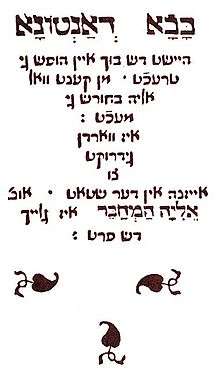Elia Levita

Elia Levita (13 February 1469 – 28 January 1549), (Hebrew: אליהו בן אשר הלוי אשכנזי) also known as Elijah Levita, Elias Levita, Élie Lévita, Elia Levita Ashkenazi, Eliyahu haBahur ("Elijah the Bachelor") was a Renaissance Hebrew grammarian, scholar and poet. He was the author of the Bovo-Bukh (written in 1507–1508), the most popular chivalric romance written in Yiddish. Living for a decade in the house of Cardinal Egidio da Viterbo, he was also one of the foremost tutors of Christian notables in Hebrew and Jewish mysticism during the Renaissance.
Life and work
Born at Neustadt near Nuremberg, to a family of Levitical status, he was the youngest of nine brothers. During his early manhood, the Jews were expelled from this area. He then moved to northern Italy, and in Padua in 1504, he wrote the 650 ottava rima stanzas of the Bovo-Bukh, based on the popular romance Buovo d'Antona, which, in turn, was based on the Anglo-Norman romance of Sir Bevis of Hampton.[1]
By 1514 he was living in Venice, where he wrote two scathing satirical pasquinades. That same year he moved to Rome, where he acquired a friend and patron, the Renaissance humanist and cardinal Egidio da Viterbo (1471–1532) of Viterbo, in whose palace he lived for more than ten years. Levita taught Hebrew to Egidio, and copied Hebrew manuscripts—mostly related to the Kabbalah—for the cardinal's library.[1] The first edition of Levita's Baḥur (Rome, 1518) is dedicated to Egidio, to whom Levita dedicated his Concordance (1521).
The 1527 Sack of Rome sent Levita into exile once more, back to Venice, where he worked as a proofreader and taught Hebrew.[1] Levita published at Venice a treatise on the laws of cantillation entitled Sefer Tuv Ta'am. At seventy years of age, Levita left his wife and children and departed in 1540 for Isny, accepting the invitation of Paul Fagius to superintend his Hebrew printing-press there. During Elia's stay with Fagius (until 1542 at Isny (in Bavaria), he published the following works: Tishbi, a dictionary focusing on words that don't appear in the Arukh,[2] containing 712 words used in Talmud and Midrash, with explanations in German and a Latin translation by Fagius (Isny, 1541); Sefer Meturgeman, explaining all the Aramaic words found in the Targum (Isny, 1541); Shemot Devarim, an alphabetical list of the technical Hebrew words (Isny, 1542); and a new and revised edition of the Bachur.[3] While in Germany he also printed his Bovo-Bukh.[1] On returning to Venice, Eliah, in spite of his great age, he worked on editions of several works, including David Kimhi's Miklol, which he also annotated.[1][3]
Elia Levita died 28 January 1549 in Venice, aged 80 years.
He has descendants living today, including former British Prime Minister David Cameron, who describes him as "my forefather Elijah Levita who wrote what is thought to have been the first ever Yiddish novel".[4][5]
Works
- Elia Levita Bachur's Bovo-Buch: A Translation of the Old Yiddish Edition of 1541 with Introduction and Notes by Elia Levita Bachur, translated and notes by Jerry C. Smith, Fenestra Books, 2003, ISBN 1-58736-160-4.
- Paris and Vienna (attributed)
- miscellaneous shorter poems
- The Massoreth Ha-Massoreth of Elias Levita, being an exposition of the Massoretic notes on the Hebrew Bible, or the ancient critical apparatus of the Old Testament in Hebrew, with an englisch translation, and critical and explanatory notes, London, Longmans, 1867[6]
Notes
- 1 2 3 4 5 [Liptzin, 1972] p.6.
- ↑ "the Seforim blog: New Book Censored". Seforim.blogspot.com. 2005-08-31. Retrieved 2016-06-25.
- 1 2 Jewish Encyclopedia article.
- ↑ "Video: David Cameron: I feel 'connection' to Jewish people". Telegraph. 2014-03-12. Retrieved 2016-06-25.
- ↑ Firth, Niall (2009-07-10). "Cameron | Daily Mail Online". Dailymail.co.uk. Retrieved 2016-06-25.
- ↑ "Massorah Massoreth Massoretic RabbinicHebrewBible.C.D.Ginsburg.1865.1905.4vols.plus3vols". Archive.org. Retrieved 2016-06-25.
References
- Gottheil, Richard and Jacobs, Joseph Baba Buch, Jewish Encyclopedia, 1901-1906
- Liptzin, Sol, A History of Yiddish Literature, Jonathan David Publishers, Middle Village, NY, 1972, ISBN 0-8246-0124-6.
 This article incorporates text from a publication now in the public domain: Joseph Jacobs and Isaac Broydé (1901–1906). "Levita, Elijah". In Singer, Isidore; et al. Jewish Encyclopedia. New York: Funk & Wagnalls Company.
This article incorporates text from a publication now in the public domain: Joseph Jacobs and Isaac Broydé (1901–1906). "Levita, Elijah". In Singer, Isidore; et al. Jewish Encyclopedia. New York: Funk & Wagnalls Company.
